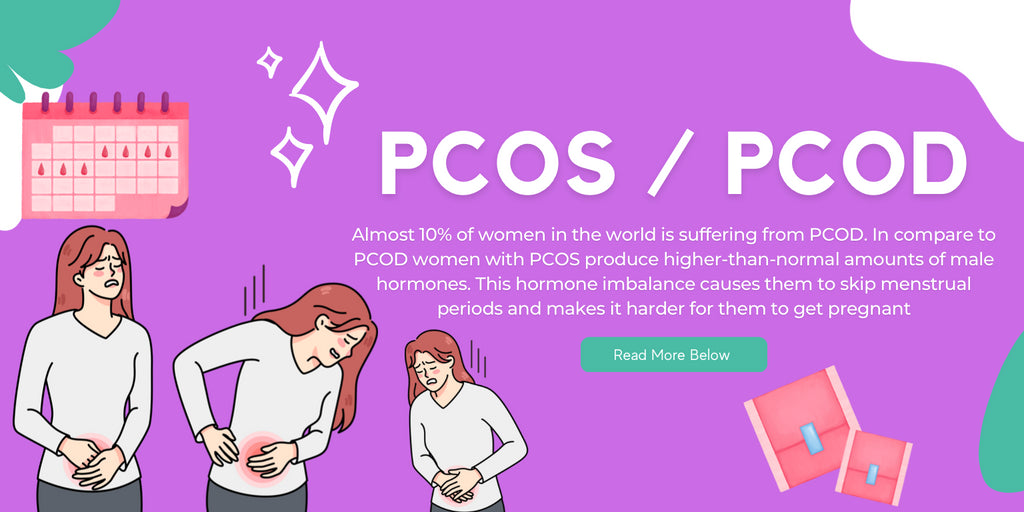PCOS and PCOD Effect and Ayurvedic Cure
Posted by AMAN PMC

PCOS/PCOD are topics that most women don't even know about it. So, now we are talking about the difference between PCOS and PCOD. This blog discusses PCOS and PCOD and clarifies their differences, symptoms, society, risks, treatment, and diagnosis.
We also clear all the myths and taboos created by society. It is straightforward to understand that Syndrome is PCOS and Disease is PCOD. Both have the same symptoms in these conditions the formation of Follicle cysts caused in the ovaries. While facing PCOS/ PCOD, there are unusual changes in the female's body due to the excessive secretion of androgen.
So, here the word Androgen means that Male steroid hormones and these hormones produced in the female give unusual changes.
Every ten women in India have PCOS problems. PCOS and PCOD are common problems, but people cannot openly discuss the issues because they are related to pregnancy and periods, and these topics are very shy in the country.
PCOS means Polycystic Ovary Syndrome, and PCOD means Polycystic Ovary Disease, and these are both problems all over the world women face.
What is PCOS?

Polycystic ovary syndrome PCOS is a hormonal disorder that is ubiquitous among women of reproductive age. PCOS is a type of syndrome in which women's ovaries are filled with sacs of liquids, and it starts growing on both ovaries. Women faced irregular periods and excess male hormones. It also affected the small collections of fluids and failed to release the eggs regularly. Girls face problems having irregular periods. PCOS is easily identified in teenagers after their first period. On the other side of PCOD, there are similar symptoms, but they become minor. In PCOD, the smaller sacs are formed on the ovaries, which can go back three months or, say that the less number. In PCOD, periods are very regular and sometimes delayed. PCOD can be detected in women when they cannot conceive childbearing.
Now we talked about the effects of PCOS/PCOD:
In PCOS, women face irregular menstrual periods, excess facial hair growth, acne, weight gain, and infertility. In the female reproductive, apart from the cysts formation and the ovaries start secreting the androgen. Women have the female estrogen, the female steroid hormone, which is a significant part of women. Androgen is the male hormone, and the ovaries secrete it in less proportion. In PCOS, the female estrogen is less, and the male estrogen increases. These are the effects and the unusual changes found in females after PCOS.
What are the Symptoms found?

- Headache
- Baldness
- Excess Facial Hair
- Irregular Periods
- Fatigue
- Depression
- Anxiety
- Sleeping problems
- Patches on the nape
- Irregular periods
- Axillary Hair
- Mood Swings
- Body Odor
- Patches on elbows
- No periods
Women face more other symptoms than after puberty itself, but irregular periods and no periods are the most common symptoms found in PCOS.
Symptoms found in the PCOD both the PCOS and PCOD symptoms are similar:
Obesity is observed in PCOD than in PCOS
Know we talk about society and what they think about the PCOS and PCOD
Many scientists and doctors research PCOS and PCOD and still find the cause of these conditions. The leading cause they found is genetics. These symptoms are found because the woman's family history has PCOS and PCOD issues. Many programs that help make women aware of women have encouraged them to discuss it openly.
Only doctors, working women, and their friends or family know about PCOS in the USA. So talking about periods is taboo, and periods issues are not a disease.
Diagnosis of PCOS/PCOD:
In PCOS or PCOD, a specific test can be a diagnosis. The symptoms and signs in both PCOS and PCOD are the same. So the gynecologist's diagnosis of symptoms or signs, family history, medical, physical exam, or a laboratory test can help the diagnosis.
In PCOS, the ovaries are 1.5 to 3 times larger than usual, and more than 12 follicles per ovary. Still, in the PCOD, the ovaries may not appear in the large follicles. Around 5 to 6 per ovary, it looks like a Pearl necklace. Many records found that 90% of women with PCOS and 25% without PCOS symptoms. Ovarium or adrenal or, say, the overgrowth in adrenal tissue called hyperplasia. Hyperplasia can cause the overproduction of male hormones in women.
Risks of PCOS/PCOD symptoms:
Depression: In the hormonal balance diagnosis with PCOS/PCOD, it causes mood swings, anxiety, depression, and behavior changes in women.
Infertility: In PCOS, females cannot conceive, or they can change their lifestyle, or in the PCOD causes infertility, it can cause the frequency of ovulation in the body.
Diabetes: In the body leading to diabetes causes insulin in the PCOS/PCOD.
Risks of PCOS/PCOD symptoms:
Depression: In the hormonal balance diagnosis with PCOS/PCOD, it causes mood swings, anxiety, depression, and behavior changes in women.
Infertility: In PCOS, females cannot conceive, or they can change their lifestyle, or in the PCOD causes infertility, it can cause the frequency of ovulation in the body.
Diabetes: In the body leading to diabetes causes insulin in the PCOS/PCOD.
Can PCOS/PCOD be cured permanently?
Women can often ask these questions to find the cure for PCOS. PCOS is not a disease. It is just like similar to diabetes. Ayurveda finds out the perfect solution to get rid of PCOS symptoms.
Treatment of PCOS/PCOD:
There is no cure to reduce the symptoms of PCOS. The treatment lessens the symptoms and complications but is not entirely cured. So maintain a perfect schedule to reduce the symptoms of PCOS, and they are Diet, exercise, and life changes.
- Daily exercise can help reduce overweight and decrease testosterone, ph levels, and insulin.
- Healthy food and regular exercise maintain cholesterol and lower blood pressure.
- Exercise also helps to improve sleep apnea problems.
- They are reducing their androgen levels while quitting smoking and other tobacco products.
- Remove the facial hairs while waxing, electrolysis and shaving.
- To relieve acne, used antibiotics and retinoic acids.
- To reduce irregular periods, prescribed oral contraceptives.
Now we see that PCOD is treated entirely while following the above treatments, but it can grow back, so working on a healthy lifestyle helps to cure PCOD.
Cure with the treatment of Ayurveda:

The PCOS problem is still growing all over the world. Western medicine does not find the perfect solution for PCOS, and it continues.
PCOS is still growing in younger women using modern medicines and the information based on the contemporary medicines system.
Although we talk about the Ayurveda, modern culture knows much less about eastern culture. The Ayurveda cure is 4000 years old and provides the solution to POCS/PCOD.
Research on Ayurveda finds out that abnormalities:
1.Eating habits
2.Unhealthy food.
Ayurveda says that 90% of illness is due to consuming unhealthy foods and bad eating habits. In Ayurveda, people eating the wrong foods can generate toxic food waste in the body, called the Ama. Ama is the leading cause of PCOS/PCOD symptoms are as irregular periods, mood swings, menopause, heavy flow, and infertility.
Ayurvedic Medicines that help to cure PCOS/PCOD:
1. Dabur Dashmularishta:
Dashmularishta is an ayurvedic syrup along with the 50 herbs known as Dashamula. It helps women to provide strength to post-natal women and regain the standard size and shape of the uterus. It helps to cure the common symptoms found in PCOS/PCOD, which are irregular periods, period pain, etc.
Herbs:
Dashmool
Manjistha
Ashwagandha
Draksha
Amalaki & Guduchi
Ingredients:
Bilva Root
Agnimantha Root
Shynaka root
Patala root
Kashmiri root
Gambhari root
Brihati root
Kantakari root
Shalaparni root
Prishnaparni root
Gokshura root
Dosage:
After a meal, mix 1-2 tbsp of Dashmularishta diluted in an equal quantity of water.
2. Gynoveda MYRAA VEERHA ayurvedic tablets:
Gynoveda Myraa ayurvedic pills combined with the Vamaa pills to reverse the PCOS symptoms. Vamana & Myraa helps to cure the root of excessive growth in facial hair.
Benefits:
Reduce the gain of weight
Excessive hair growth
Boost the metabolism and improve fertility
It helps women to conceive while using the PCOS treatment for 3months
Ingredients:
Giloy Kanchnar Varuna,Trikatu,Trijata,Bilvapatra,Ashwagandha,Haldi,Amalaki,Methika,Peethika,Vijaysar,Avartaki,Jamun,Meshashringi,Mamejava,Saptarangi,Neem,Karela,Yashada,Bhasma,Kutaja,Patrol,Kutki,Haritaki,Manjistha,Kasis,Loha,Hindu Rasa, Reason, Aloe vera, Chitika, Satavari, Dashmoola, Gajar Beeja, Jyotishmati, Methi ka, Pippali, Shatapushpa, Ulatkambal, Karpas Beeja, Kulattha, Krishna Jeeraka, Chandrashoor Deodar
Dosage:
MYRHA: Consume two tablets after waking up and two tablets before the bedtime
VAMHA: Consume two pills after waking up and two tablets before bedtime.
3 Patanjali Divya Dashmularistha:
Divya Dashmularishta is the goodness of dashmool with other herbs and natural extracts. It helps to cure uterine infections and weakness in women. Boost immunity gives strength and is valuable in the case of infertility.
Ingredients:
Dashmool
Draksa
Bilva
Syonaka
Haritaki
Guda
Kantakari
Dosage:
Daily, consume 10-15ml of health tonic with an equal quantity of water or as directed by the physician.
Conclusion:
PCOS is the most common disorder, and it is not a disease. A healthy diet, exercise, and treatment with ayurvedic medicines help to cure the PCOS/PCOD symptoms.

